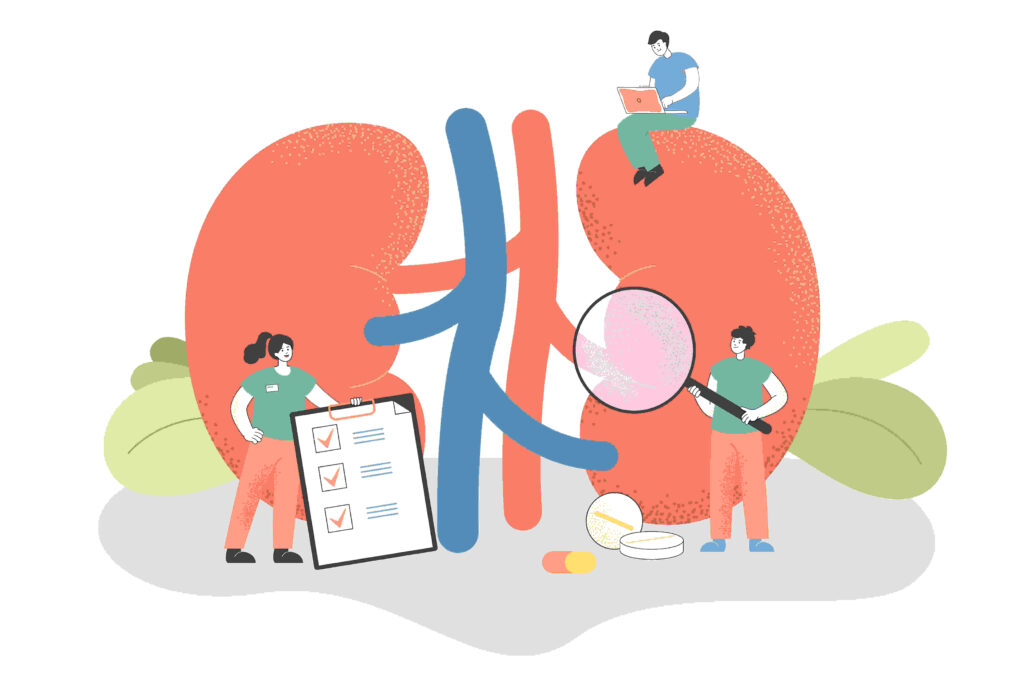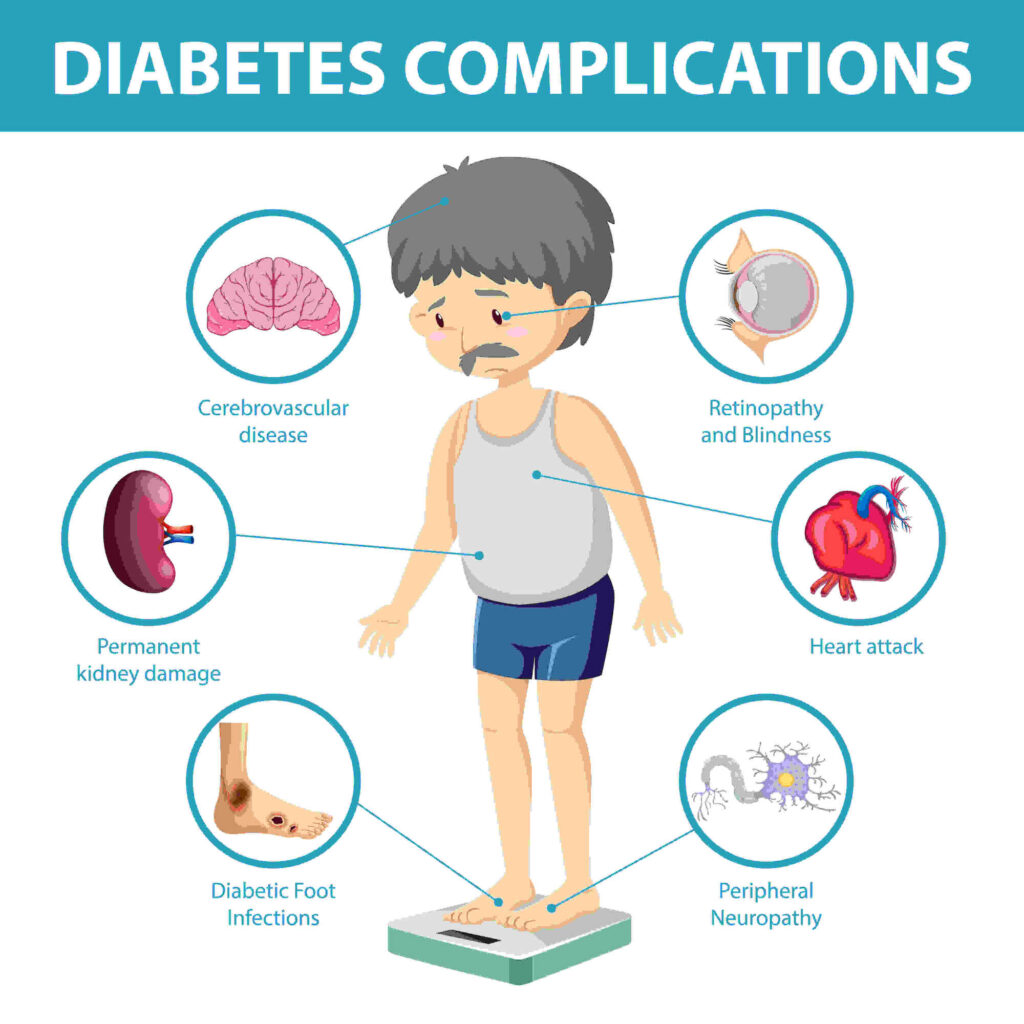Protecting Your Kidneys from the Diabetes Beast: Diabetes and Kidney Disease
Table of contents
- ● Diabetes and Kidney Disease
- ● Why does diabetes and kidney disease happen?
- ● Do I have diabetes and kidney disease?
- ● How can prevent diabetes and kidney disease?
- ● Takeaway
- ● FAQs
Diabetes and Kidney Disease
Diabetes is a forever hungry beast. It slowly and steadily devours the better half of your body. The effects of diabetes go beyond its well-known complications and affect essential organs like the kidneys, causing diabetes and kidney disease. Both type 1 and type 2 diabetes are related to increased blood sugar levels
and poor blood circulation; both create havoc for the filtration and excretory organs of our bodies, the kidneys. One of the leading causes of chronic renal failure is diabetes, with many patients advancing to end-stage renal disease (ESRD) and needing dialysis or kidney transplantation. In this blog, we investigate the puzzling relationship between diabetes and kidney health.
How Does Diabetes Affect the Kidneys?
Diabetic nephropathy, or diabetic kidney disease, is a form of kidney illness caused by diabetes. It occurs when the blood vessels that supply the kidney get damaged by persistently high blood sugar levels.
Here is what can cause diabetes and kidney disease:
The primary function of the kidneys is to remove surplus water and waste products from the body through the blood in the form of urine. The kidneys also produce certain vital hormones that regulate and maintain your blood pressure. Hence, the kidneys need a rich and intricate supply of blood to function properly.
Hyperglycemia (persistently high blood sugar levels) in diabetes affects the kidneys in two ways:
● Damage to the blood vessels
Diabetes damages the body’s tiny blood vessels. Your kidneys cannot effectively purify the blood if the
blood vessels inside them are damaged. The kidneys retain more salt and water than usual. The urine then contains higher amounts of compounds like protein and accumulated waste products.
● Damage to the nerve supply of the kidneys
Diabetes damages your body’s nerves as well. The bladder may find it challenging to empty as a result.
The pressure from a full bladder can build up and harm the kidneys. The stagnant urine in the bladder is rich in sugars and is an ideal breeding ground for bacteria, leading to infections.
● Accumulation of toxic waste and free radicals in the kidneys
Chronic hyperglycemia activates pathological processes that harm kidney cells and result in
hyperglycemia-induced tissue destruction. Over time, these processes reduce excretion and accumulate
toxic waste like free radicals. An overload of free radicals causes severe inflammation of the kidney cells,
damaging them.
Do I have diabetes and kidney disease?
Diabetes normally damages the kidneys slowly over a long period of time. You can safeguard your
kidneys and take measures to halt or delay kidney damage.
Can Kidneys Be Affected By Diabetes – The Risk Factors
You have a higher risk of developing kidney disease if you have diabetes and the following factors:
- ● Uncontrolled high blood sugar
- ● Hypertension, or chronically high blood pressure
- ● Smoking and tobacco use
- ● Obesity
- ● High blood cholesterol
- ● A history of diabetes and renal disease in the family
Signs of diabetic kidney disease
Early signs:
- ● Routine urine analysis shows albumin in the urine
- ● High blood potassium levels
- ● Fluid retention, which can cause foot and ankle swelling, foot ulcers, high blood pressure, or fluid
in the lungs - ● Weight gain
- ● Visiting the toilet more often at night
Late signs
- ● Reduced hemoglobin (Hb), or anemia
- ● Frequent episodes of diarrhea, erectile dysfunction, and other issues because of damage
- ● Nausea
- ● Loss of appetite
- ● Weakness and growing exhaustion
- ● Itching
- ● Muscle cramping (particularly in the legs)
How can you prevent diabetes and kidney disease?
Try to meet your blood glucose and blood pressure goals, as these are the best ways to reduce or avoid
diabetes-related kidney damage. You can accomplish them by adopting healthy lifestyle practices and
taking your medications as directed.
● Regular blood sugar monitoring
To keep your blood sugar within desired levels, routinely check your blood sugar, adhere to your
diabetologist’s recommended treatment plan, take medications as directed, and make any necessary
lifestyle changes.
● Regular blood pressure checks
Work with your doctor to manage any problems, such as high blood pressure, that put you at risk for renal
disease.
● Maintaining the medications
Do not be erratic with your diabetes and hypertension medications. Be disciplined and take your
medicines and inulin shots on time.
● Periodic complete urine and blood analysis
These reports are best for the early detection of any kidney disease.
● Maintain a Healthy Weight
Diabetes and renal disease are both significantly impacted by obesity and excess body weight.
Concentrate on eating a balanced diet and getting regular exercise to help you reach and maintain a
healthy weight.
● Eat a balanced diet
Focus on whole, unprocessed foods such as fruits, vegetables, whole grains, lean meats, and healthy fats.
Limit your consumption of processed foods, sugary beverages, and foods high in saturated fats and
sodium. A registered dietician might be consulted for tailored advice.
● Stop Smoking
Smoking weakens kidney function and harms blood vessels. In addition to lowering your chance of
kidney damage, quitting smoking also lowers your risk of other health issues.
● Limit Alcohol Consumption
Drinking too much alcohol might aggravate renal damage and raise blood pressure. If you prefer to
consume alcohol, do it in moderation (no more than one drink for women and two for men each day).
● Stay Hydrated
Drink an adequate amount of water throughout the day to help support kidney function and prevent
dehydration.
Takeaway
Diabetes and kidney disease can get worse over time if left untreated. Diabetes and kidney stones, or
diabetes and kidney failure, are a few common complications. Diabetes management is not always
simple. It’s normal to be stressed about the complications of diabetes. You may know what to do to stay healthy, but sticking to your strategy over time may be difficult. You may lower your risk of acquiring
kidney disease and diabetes by making certain lifestyle changes, which will lead to a healthier, happier life.
FAQs
● How long does it take for diabetes to cause kidney damage?
The timeline for diabetes to cause kidney damage can vary from person to person. Diabetic nephropathy,
commonly known as kidney damage caused by diabetes, often takes place over a long period of time. It
often takes several years, sometimes a decade or more, to manifest.
● Is kidney issue due to diabetes curable?
Diabetes-related kidney problems, are progressive and can result in chronic renal disease. Although
diabetic kidney disease is currently incurable, early detection and effective care can help slow down the
disease’s course, avoid complications, and maintain kidney function.
● Does diabetes affect creatinine levels?
The kidneys eliminate creatinine, a waste product of the muscles. It is commonly used as a marker to
assess kidney function. As diabetic kidney disease progresses, the kidneys may become less efficient in
filtering creatinine, resulting in an increase in creatinine levels in the blood.









